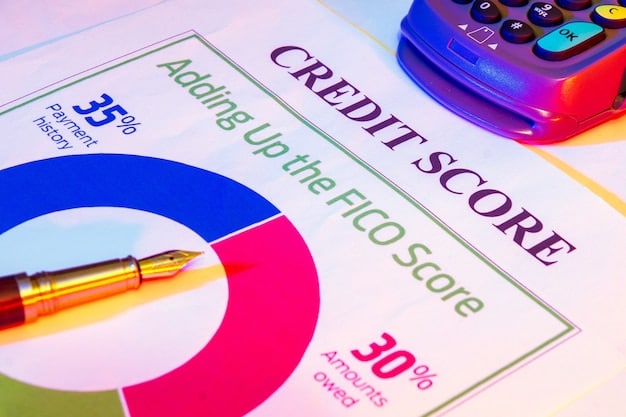Boost Your Freelance Credit Score: Tips & Strategies

Freelance Credit Score: How to Improve Your Credit and Qualify for Better Rates explores actionable strategies for freelancers to enhance their credit scores, secure better financial opportunities, and manage finances effectively, crucial for long-term stability and growth in the gig economy.
As a freelancer, managing your Freelance Credit Score: How to Improve Your Credit and Qualify for Better Rates is crucial for your financial health. Many freelancers find it challenging to navigate the credit landscape, but with the right strategies, you can improve your credit score and unlock better financial opportunities.
Understanding Your Freelance Credit Score
Understanding your credit score as a freelancer is the first step toward financial stability. Your credit score is a numerical representation of your creditworthiness, influencing your ability to secure loans, rent an apartment, or even get approved for certain jobs.
What Makes Up Your Credit Score?
Several factors contribute to your credit score. Payment history, amounts owed, length of credit history, credit mix, and new credit are all considered by credit bureaus. Understanding these factors is crucial for improving your score.
- Payment History: Making timely payments on all your debts is the most significant factor.
- Amounts Owed: Keeping your credit utilization ratio low (the amount of credit you’re using compared to your total available credit) is vital.
- Length of Credit History: A longer credit history typically results in a higher score.
- Credit Mix: Having a mix of different types of credit accounts (e.g., credit cards, loans) can positively impact your score.
Knowing how each of these factors affects your credit score allows you to focus on specific areas for improvement. Regular monitoring of your credit report can also help you identify any inaccuracies that need to be addressed.

In conclusion, a strong understanding of the components of your credit score empowers you to take control of your financial future. By focusing on these elements, freelancers can establish a solid financial foundation, paving the way for growth and success.
Establishing Credit as a Freelancer
Establishing credit as a freelancer can seem daunting, especially if you’re new to the gig economy. However, with a few strategic steps, you can build a solid credit history and improve your financial standing.
Secured Credit Cards
One of the easiest ways to establish credit is by using secured credit cards. These cards require a cash deposit as collateral, making them accessible to those with limited or no credit history. Responsible use can significantly improve your credit score over time.
As you use the secured credit card and make timely payments, the credit card company reports your activity to credit bureaus. This helps build your credit history and demonstrates responsible credit management.
Credit-Builder Loans
Another option is to take out a credit-builder loan. These loans are designed specifically for individuals with little to no credit history. You make fixed monthly payments, and the lender reports your payment activity to credit bureaus.
- Choose a reputable lender that reports to all three major credit bureaus.
- Make sure the loan terms are manageable and affordable.
- Set up automatic payments to avoid missing any due dates.
By establishing credit through secured credit cards and credit-builder loans, freelancers can lay the groundwork for a strong financial future. This proactive approach demonstrates fiscal responsibility and opens doors to better financial opportunities.
Separating Business and Personal Finances
Separating business and personal finances is crucial for freelancers. It simplifies tax reporting, provides a clear view of your business’s financial health, and helps protect your personal assets in case of legal issues.
Open a Business Bank Account
Opening a separate business bank account is one of the most important steps you can take. This account should be used exclusively for business-related transactions. It makes it easier to track income and expenses, which simplifies tax preparation.
Using a business bank account helps you maintain a clear record of your earnings and expenditures. This segregation is essential for accurately assessing your business’s profitability and making informed financial decisions.
Apply for a Business Credit Card
Applying for a business credit card is another excellent way to separate your finances. These cards often come with rewards and benefits tailored to business owners. Responsible use of a business credit card can also help you build your business credit score.
- Research different business credit cards to find one that offers the best rewards for your spending habits.
- Use the card for business-related purchases only.
- Pay your balance in full and on time each month to avoid interest charges and build a positive credit history.

In conclusion, separating your business and personal finances is a cornerstone of responsible freelance financial management. This practice streamlines your financial operations, enhances your creditworthiness, and provides vital insights into your business’s performance.
Managing Debt Responsibly
Managing debt responsibly is a crucial aspect of maintaining a healthy credit score. High levels of debt can negatively impact your score, making it harder to secure loans and other financial products.
Create a Budget
Creating a budget is the first step to managing debt effectively. A budget helps you track your income and expenses, allowing you to identify areas where you can cut back and allocate more funds towards debt repayment.
By understanding where your money is going, you can create a realistic plan to pay down your debts. A budget provides a roadmap to financial stability and helps you make informed decisions about your spending.
Prioritize High-Interest Debt
When managing debt, it’s essential to prioritize high-interest debt. These debts, such as credit card balances, can quickly become overwhelming due to the accumulation of interest charges. Focus on paying off these debts first to save money in the long run.
- Use the debt snowball method, where you pay off the smallest debts first to gain momentum.
- Consider the debt avalanche method, where you focus on paying off the debts with the highest interest rates first.
- Explore balance transfer options to move high-interest debt to a card with a lower interest rate.
By managing debt responsibly, freelancers can proactively safeguard their creditworthiness and maintain a healthy financial profile. This strategy not only minimizes financial stress but also paves the way for future financial opportunities and success.
Monitoring Your Credit Report Regularly
Monitoring your credit report regularly is essential for detecting errors and preventing fraud. By reviewing your credit report from all three major credit bureaus, you can ensure that your credit information is accurate and up-to-date.
Check for Errors
One of the main benefits of monitoring your credit report is the ability to check for errors. Errors on your credit report can negatively impact your credit score. Common errors include incorrect account balances, accounts that don’t belong to you, and inaccurate payment history.
If you find any errors on your credit report, it’s essential to dispute them with the credit bureau. The credit bureau is required to investigate the dispute and correct any inaccuracies.
Identity Theft Protection
Monitoring your credit report can also help protect you from identity theft. Identity theft occurs when someone steals your personal information and uses it to open fraudulent accounts or make unauthorized purchases. By monitoring your credit report, you can quickly identify any suspicious activity and take steps to protect yourself.
- Sign up for credit monitoring services that alert you to changes in your credit report.
- Set up fraud alerts with the credit bureaus to require creditors to verify your identity before opening new accounts.
- Consider placing a credit freeze on your credit report to prevent anyone from opening new accounts in your name.
In conclusion, regular monitoring of your credit report is an indispensable practice for freelancers aiming to maintain impeccable financial health. This habit empowers you to proactively address inaccuracies, safeguard against identity theft, and ensure your credit information remains accurate and reflective of your responsible financial behavior.
Strategies for Maintaining a Good Credit Score
Maintaining a good credit score requires ongoing effort and responsible financial habits. Building a positive credit history is a long-term process that involves making timely payments, keeping credit utilization low, and avoiding unnecessary debt.
Pay Bills on Time
One of the most important strategies for maintaining a good credit score is to pay your bills on time. Payment history is the most heavily weighted factor in your credit score, so even a single late payment can have a negative impact. Set up automatic payments to ensure that you never miss a due date.
Consistently paying your bills on time demonstrates to creditors that you are a responsible borrower. This builds trust and can lead to better credit terms in the future.
Keep Credit Utilization Low
Keeping your credit utilization low is another important factor in maintaining a good credit score. Credit utilization is the amount of credit you’re using compared to your total available credit. Aim to keep your credit utilization below 30% to avoid negatively impacting your score.
- Pay down your credit card balances each month to keep your utilization low.
- Avoid maxing out your credit cards, as this can significantly lower your credit score.
- Request a credit limit increase to increase your available credit and lower your utilization ratio.
Maintaining a good credit score is a continuous journey of responsible financial decisions and consistent effort. This proactive approach ensures freelancers can secure the best possible financial opportunities and maintain long-term financial stability.
| Key Point | Brief Description |
|---|---|
| 📊 Understand Credit Score | Know the factors impacting your credit score. |
| 💳 Establish Credit | Use secured cards and credit-builder loans. |
| 💼 Separate Finances | Keep business and personal finances separate. |
| 🧾 Monitor Credit Report | Regularly check for errors and fraud. |
Frequently Asked Questions (FAQ)
▼
A good credit score helps freelancers secure loans at favorable rates, rent properties, and obtain business credit cards. It demonstrates financial reliability and opens doors to various opportunities for business growth and stability.
▼
You should check your credit report at least once a year. Monitoring it regularly helps you identify errors or signs of fraud, ensuring your credit information remains accurate and secure. Consider setting reminders to stay consistent.
▼
A good credit utilization ratio is below 30%. Keeping your credit utilization low demonstrates responsible credit management and positively impacts your credit score. Try to pay down balances regularly to stay within this range.
▼
Yes, if you use a personal credit card for business expenses and carry a high balance, it can negatively affect your personal credit score. Separating business and personal finances helps prevent this issue, ensuring better credit management.
▼
If you find an error on your credit report, dispute it with the credit bureau immediately. Provide them with detailed information and any supporting documentation to correct the error promptly. Follow up to ensure the issue is resolved.
Conclusion
Improving and maintaining your freelance credit score is essential for your financial wellbeing. By understanding the factors that affect your credit score, establishing good credit habits, and managing your finances responsibly, you can unlock better financial opportunities and secure a brighter future. Take control of your credit score today and pave the way for your freelance success.





